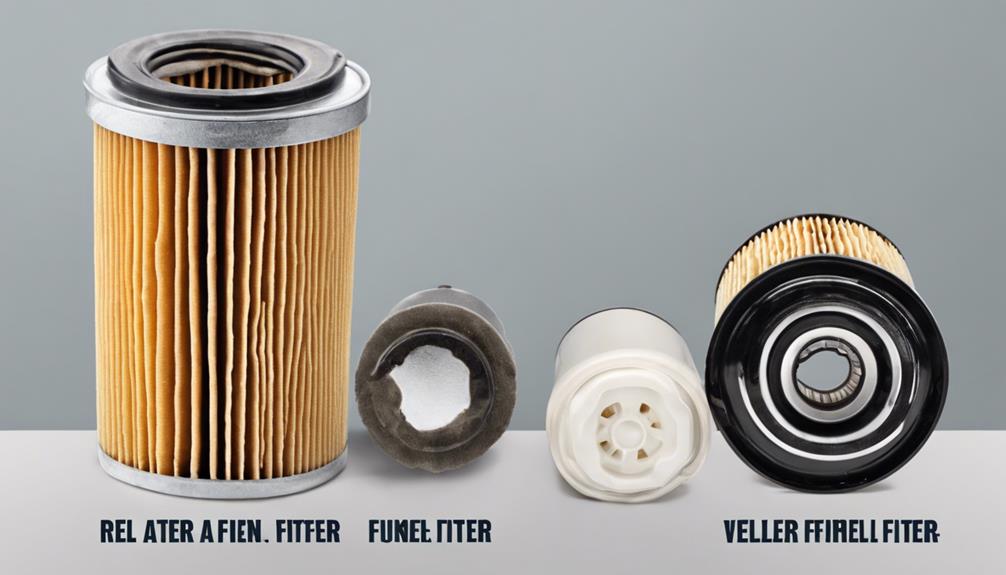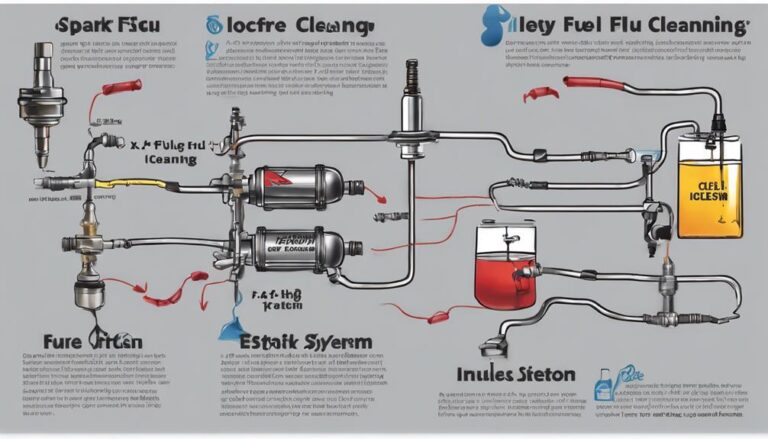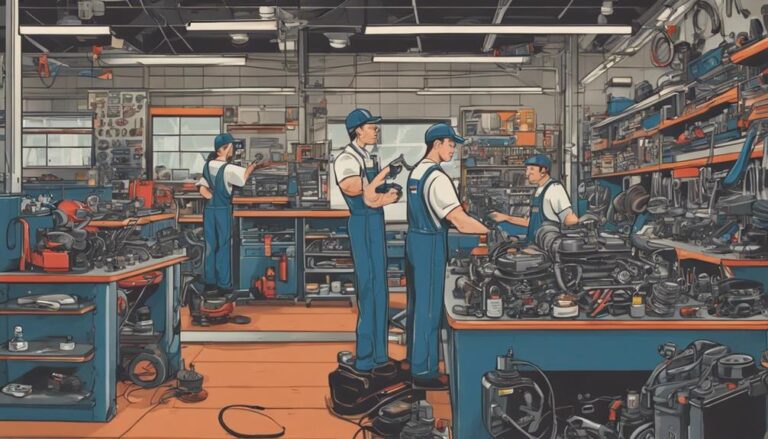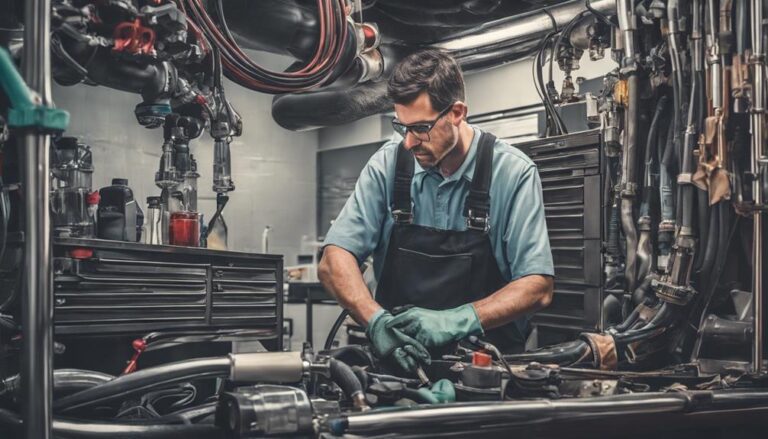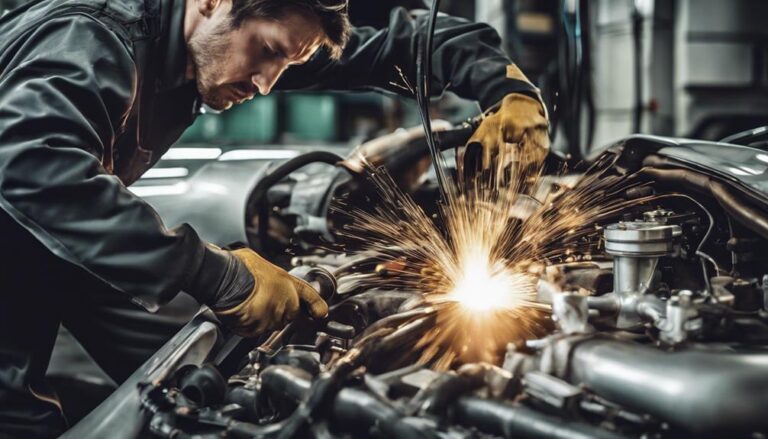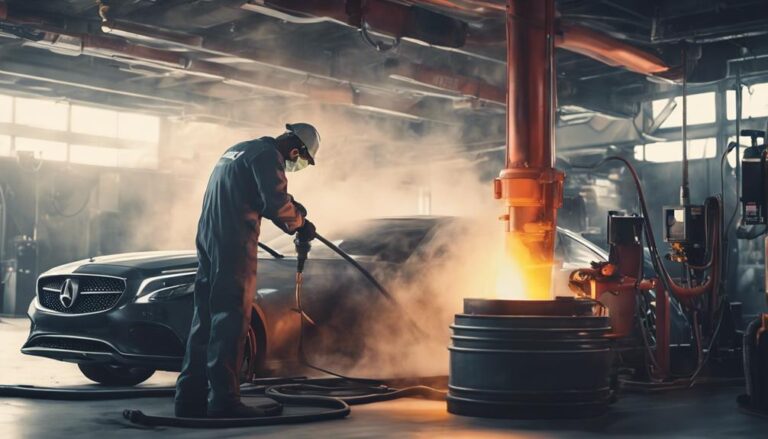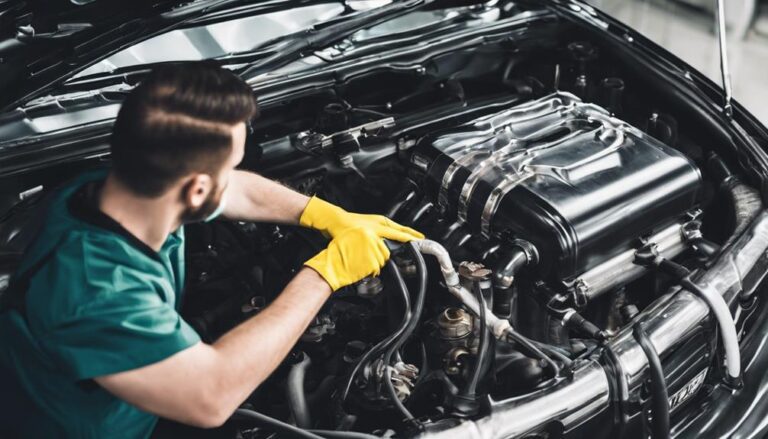When to Replace Your Car's Fuel Filter
Have you ever wondered if your car's fuel filter might be the culprit behind some of its performance issues? The answer could be simpler than you think.
Understanding when to replace your fuel filter can safeguard you from potential headaches down the road. By knowing the signs and symptoms to look out for, you can guarantee your vehicle stays running smoothly and efficiently.
So, before you dismiss those subtle hints your car might be giving you, consider the impact a well-maintained fuel filter can have on its overall performance.
Key Takeaways
- Regular fuel filter replacement every 20,000 to 30,000 miles maintains peak engine performance.
- Signs like engine hesitation, rough idling, or difficulty starting indicate a clogged filter.
- Quality filter materials and environmental conditions impact the filter's lifespan and efficiency.
- Clean fuel flow ensures efficient combustion, preventing engine hesitation and performance issues.
Signs Your Fuel Filter Needs Replacement
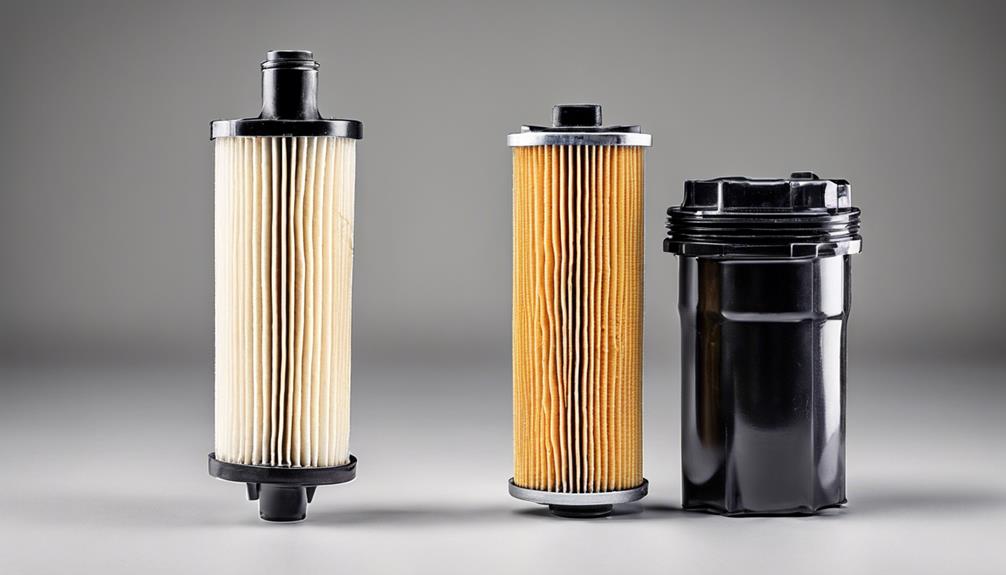
If your car is experiencing issues such as engine sputtering or loss of power, it may be time to replace your fuel filter. The fuel filter plays a vital role in ensuring top engine performance and fuel efficiency. A clogged or dirty fuel filter can restrict the flow of fuel to the engine, leading to poor combustion and decreased power output. This can result in symptoms like engine hesitation, misfiring, or rough idling.
Maintaining a clean fuel filter is essential for preserving your engine's performance and fuel efficiency. By replacing the fuel filter at regular intervals, you can prevent contaminants from entering the engine and causing damage. This simple maintenance task can help you avoid costly repairs down the road and ensure that your vehicle operates smoothly.
Keeping an eye out for signs of a failing fuel filter and addressing them promptly can go a long way in maintaining your car's engine health and overall performance. Regularly inspecting and replacing your fuel filter according to the manufacturer's recommendations is key to ensuring a smooth and efficient driving experience.
Recommended Fuel Filter Replacement Intervals
To maintain peak engine performance and fuel efficiency, adhere to the recommended fuel filter replacement intervals based on your vehicle's manufacturer guidelines.
Following a maintenance schedule for fuel filter replacement is essential in ensuring ideal filter performance. Most manufacturers suggest replacing the fuel filter every 20,000 to 30,000 miles, but it's vital to consult your vehicle's specific manual for precise recommendations.
Regularly changing the fuel filter helps prevent contaminants from reaching the engine, ensuring proper fuel flow and combustion. Neglecting to replace the filter at the recommended intervals can lead to decreased fuel efficiency, engine misfires, and poor acceleration.
Symptoms of a Clogged Fuel Filter
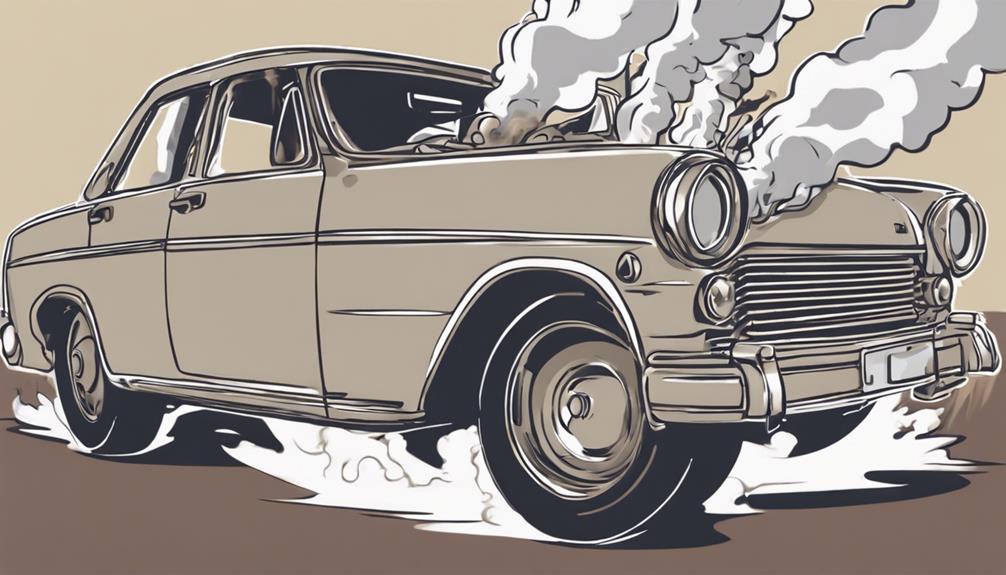
Common signs of a clogged fuel filter include engine hesitation, rough idling, and difficulty starting. If you're experiencing any of these issues, it might be time to check your fuel filter. Here are some symptoms to look out for:
- Engine Hesitation: When accelerating, if your vehicle seems to stumble or hesitate, it could be due to a lack of fuel reaching the engine, a common sign of a clogged fuel filter.
- Rough Idling: A clogged fuel filter can disrupt the smooth idling of your engine, causing it to vibrate or shake while stationary.
- Difficulty Starting: If your car is taking longer than usual to start or requires multiple attempts, a clogged fuel filter may be restricting the flow of fuel to the engine.
Importance of Regular Fuel Filter Maintenance
Regular maintenance of your car's fuel filter is essential to guarantee best engine performance and longevity. Over time, your fuel filter accumulates dirt, debris, and contaminants that can obstruct the flow of fuel to the engine.
When the filter becomes clogged, it can lead to a decrease in fuel efficiency and hinder engine performance. By regularly replacing or cleaning your fuel filter, you make sure that clean fuel reaches the engine, promoting efficient combustion and maximizing fuel efficiency.
This not only helps in maintaining your engine's performance but also contributes to its longevity by reducing the risk of damage caused by contaminated fuel. Neglecting fuel filter maintenance can result in poor engine performance, decreased fuel efficiency, and potential damage to engine components.
Hence, staying on top of your fuel filter maintenance schedule is critical for keeping your engine running smoothly and efficiently.
Factors Influencing Fuel Filter Lifespan
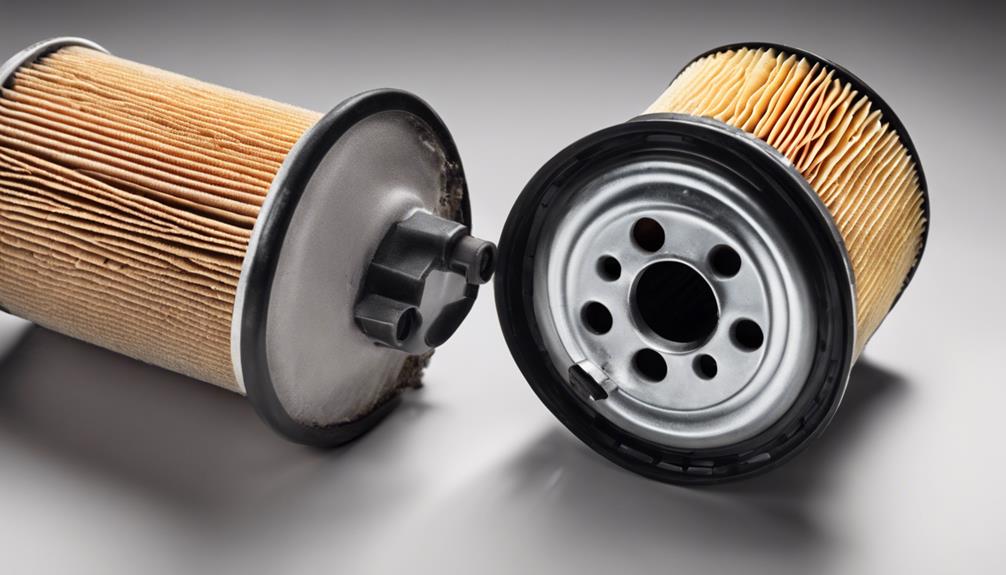
Ensuring proper fuel quality and regular maintenance practices greatly impact the lifespan of your car's fuel filter. Several factors influence how long your fuel filter can last:
- Fuel Filter Materials: The materials used in the construction of your fuel filter play an important role in determining its lifespan. High-quality filters made from durable materials tend to have a longer life expectancy compared to lower-grade filters.
- Environmental Conditions: The environment in which you drive your car can have a significant effect on the lifespan of your fuel filter. Dusty or dirty road conditions can lead to a quicker accumulation of debris in the filter, potentially reducing its efficiency and longevity.
- Fuel Quality: The quality of fuel you use in your vehicle can also impact how long your fuel filter lasts. Contaminated or low-quality fuel can introduce impurities that clog the filter faster, leading to a shorter lifespan and potential issues with your engine's performance.
Frequently Asked Questions
Can a Fuel Filter Be Cleaned Instead of Replaced?
You can clean a fuel filter, but it's not recommended. DIY cleaning may not fully restore effectiveness. Professional services guarantee thorough cleaning, often more cost-efficient than frequent DIY attempts. Consider professional maintenance for the best filter performance.
Are There Different Types of Fuel Filters for Different Vehicles?
When choosing a fuel filter, consider compatibility comparisons for different vehicles. Efficiency evaluations help make sure top-notch performance. Selecting the right type enhances your car's fuel system function, promoting longevity and smooth operation.
Can a Clogged Fuel Filter Cause Damage to Other Parts of the Car?
Ignoring fuel filter maintenance can harm your car's engine performance. A clogged filter restricts fuel flow, causing strain on other components. Regular maintenance guarantees smooth operation and prevents costly repairs. Don't overlook this important aspect of car care.
How Can I Prevent Fuel Filter Clogs From Occurring?
To prevent fuel filter clogs and maintain fuel efficiency, engage in preventative maintenance. DIY cleaning and regular inspections are key. Troubleshooting tips include checking for signs of poor engine performance or stalling, indicating a potential clog.
Is It Possible to Visually Inspect a Fuel Filter to Determine if It Needs to Be Replaced?
To determine if a fuel filter needs replacement, conduct regular visual inspections. Look for signs of clogs or debris accumulation. Use proper inspection techniques to guarantee Fuel Filter Maintenance. This visual check helps prevent issues.
Conclusion
To summarize, replacing your car's fuel filter is essential to guarantee proper engine performance. Did you know that a clogged fuel filter can decrease fuel efficiency by up to 20%?
By following recommended replacement intervals and monitoring for symptoms of a clogged filter, you can prolong the lifespan of your engine and save on fuel costs in the long run.
Stay proactive in maintaining your fuel filter to keep your vehicle running smoothly.

